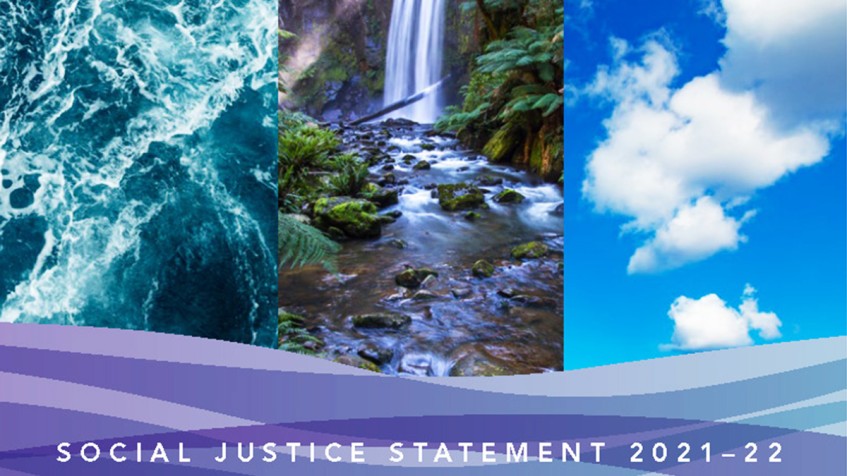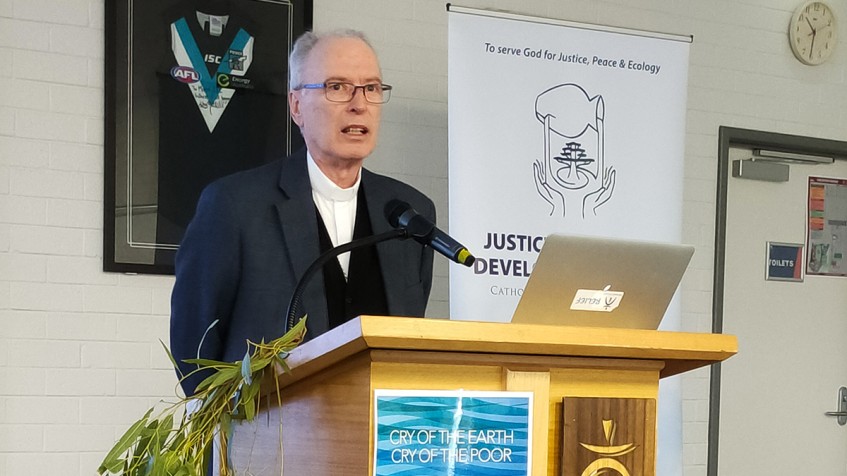Cry of the Earth, Cry of the Poor calls for economic and ecological conversion

The Australian Catholic Bishops’ Conference’s Social Justice Statement 2021-2022: Cry of the Earth, Cry of the Poor. Image: Front Cover.
By Eric Martin
The Australian Catholic Bishops’ Conference has echoed the call by Pope Francis in his encyclical, Laudato Si, to reject the ‘technocratic paradigm, with its ideology of the domination of nature,’ with the release of the Social Justice Statement 2021-2022: Cry of the Earth, Cry of the Poor.
The Perth Launch was hosted by the Justice Ecology Development Office (JEDO), at Newman College (Churchlands) on Thursday, 8 August, with Bishop Donald Sproxton, in his role as a member of the Bishops’ Commission for Social Justice, Mission and Service.
“It is an honour, once again, to launch the Social Justice Statement, and this topic is one that is very close to the heart of the Australian Bishops’ Conference,” Bishop Don said.
“It’s a statement in which we will find a Christian foundation, a source for our thinking about the ecology and our relationship to it, a wealth that comes from the scriptures, from Catholic social justice teaching and the wisdom in the world, as it is taught.”
Bishop Don continued his speech by highlighting that climate change, deforestation and other anthropogenic damage to the environment has, alongside the pandemic, has been one of the key issues facing the global community in the last two years: the destruction of millions of hectares of Australian bushland on the east coast, the devastation caused by record rainfall and flooding in Germany, China and India, the bushfires ravaging Greece, Turkey and the US, have hammered home the message that something needs to change if we want to preserve this world for our children.
In their opening statement, the Australian Bishops say that they stand with Pope Francis in acknowledging that “a very solid scientific consensus indicates that we are presently witnessing a disturbing warming of the climatic system,” and that “humanity is called to recognise the need for changes of lifestyle, production and consumption, in order to combat this warming or at least the human causes which produce or aggravate it.”
Pope Francis explains that “we must examine our lives and acknowledge the ways in which we have harmed God’s creation through our actions and our failure to act. We need to experience a conversion, or change of heart.”
It is an ecological and economic conversion that fundamentally changes the way that Catholics engage with the Earth.

Auxiliary Bishop of Perth Donald Sproxton addresses the audience at the WA launch of Cry of the Earth, Cry of the Poor at Newman College, 8 August 2021. Photo: Eric Martin.
Considering that Unicef’s recent Survey for World Children’s Day found that the environment is the number one concern for Australian children aged between 10 and 16, this is a crucial area for future pastoral support, the Statement enables the Australian Church to engage in meaningful dialogue with youth on this issue.
As the Social Justice Statement 2021-22 states, “(Young people) see their future being threatened, and want change as a matter of intergenerational justice.”
Speakers at the launch were consistent in emphasising that Cry of the Earth, Cry of the Poor is particularly relevant in light of the recent, widely publicised Intergovernmental Panel on Climate Change (IPCC) report, Climate Change 2021: The Physical Science Basis.
The report clearly highlighted the need for urgent action if we are to avoid the catastrophic changes to weather patterns associated with a temperature increase greater than 1.5 degrees Celsius – calling on governments and industry to halt all future investment in fossil fuels and recommit to net-zero emissions by 2050.
Unsurprisingly, here in Australia, with our very well documented poor record of action on climate change, the economic and social impacts of a global policy change to support environmental goals poses a greater risk than to almost any other developed nation (Australia is ranked last out of 200 developed countries in terms of our commitment).
Many regional towns are still heavily dependent on fossil fuel related industries, such as coal mining and view the transition from a carbon-based economy as a threat to their communities and per capita, we have the largest carbon-footprint of any nation: Australians will face some of the biggest challenges in adjusting to the ‘Economy of Francesco.’
The Bishops’ Social Justice Statement 2021-2022 draws from Scripture, theological tradition, Catholic Social Justice Teaching, scientific research and the lived experience of First Nations Peoples, to offer a genuinely Christian response to the cry of the earth and the cry of the poor: “The signs of the times are clear – we know that we human beings need a change of heart, mind and behavior – Pope Francis continues to call us to an ecological conversion and an economic conversion, and we want to respond.”
